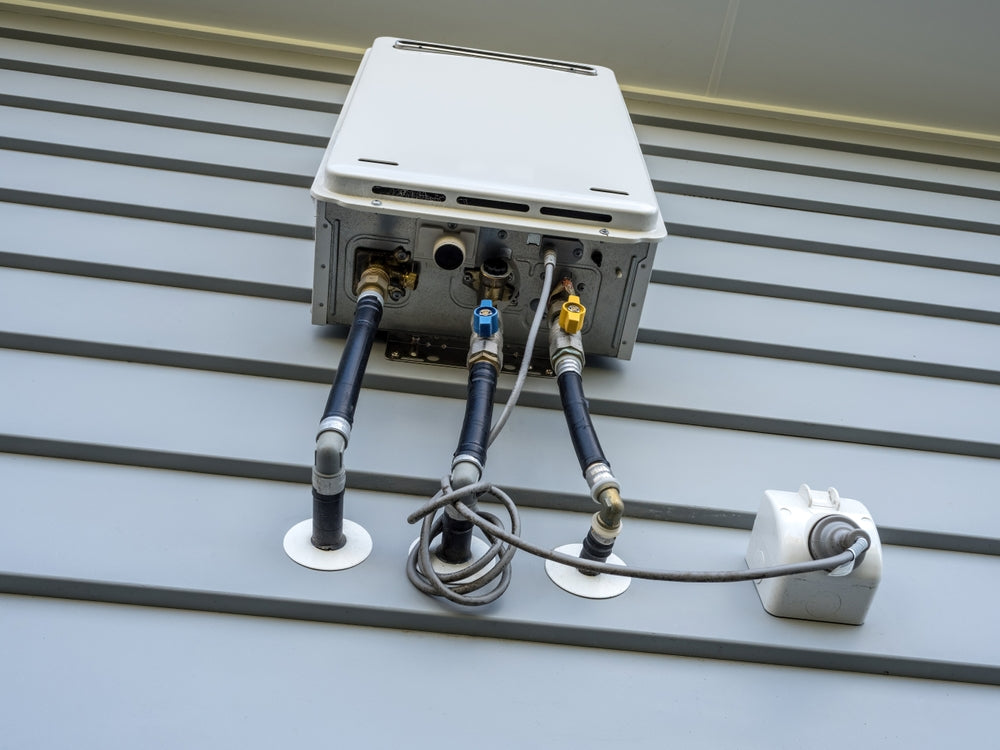
Choosing the right water geyser for your home can be overwhelming, given the numerous options available today. The right choice depends on various factors, including your household size, hot water needs, and energy efficiency preferences.
In this guide, we'll walk you through the different types of geysers, their features, and what to consider when making your decision. By the end, you'll be well-equipped to choose the best water geyser for your home.
1. Understanding the Different Types of Water Geysers
Before you choose a water geyser, it’s important to understand the different types available in the market. Each type has its advantages and is suitable for different needs.
-
Electric Geysers
These are the most common and popular types of water geysers. They use electricity to heat the water and are available in both instant and storage options.
- Instant Electric Geysers: These heat water immediately as it passes through, making them ideal for small households or quick showers.
- Storage Electric Geysers: These store a certain amount of hot water and keep it at the set temperature. They are great for larger households that need a continuous supply of hot water.
-
Gas Geysers
Gas geysers use natural gas or LPG to heat water. They are often more energy-efficient than electric models and are suitable for homes with a steady gas supply. -
Solar Water Heaters
Solar water heaters use solar panels to heat water. They are environmentally friendly and cost-effective in the long run but require proper installation and a sunny location. -
Heat Pump Water Heaters
Heat pump water heaters use electricity to move heat from one place to another rather than generating heat directly. They are energy-efficient but have a higher upfront cost.
2. Consider the Capacity Based on Your Needs
The capacity of the water geyser you choose should align with your household’s hot water usage. Picking the wrong size can lead to energy wastage or insufficient hot water supply.
- 10-15 Liters: Suitable for small families or single-person households who use geysers for quick showers or washing dishes.
- 25-50 Liters: Ideal for medium-sized families or homes where multiple people may need hot water simultaneously.
- 50 Liters and Above: Best for larger households where hot water is used frequently throughout the day, such as for baths, washing clothes, and more.
3. Instant vs. Storage Water Geysers: Which One to Choose?
Understanding the difference between instant and storage water geysers is key to choosing the right one.
Instant Water Geysers
These heat water instantly, providing it on demand. They are compact, take up less space, and are energy-efficient because they don’t store and constantly heat water. However, they are suitable for smaller hot water needs, such as a quick shower or hand washing.
Storage Water Geysers
Storage geysers come with a tank that stores a set amount of hot water. They are perfect for larger families who need a continuous supply of hot water. Although they consume more energy to keep water heated, they provide convenience for multiple users.
4. Energy Efficiency and Star Ratings
Energy efficiency is a critical factor when choosing a water geyser, as it affects your electricity bills and the environment. In many regions, water geysers come with star ratings that indicate their energy efficiency levels.
- 5-Star Rated Geysers: These are the most energy-efficient and help reduce electricity costs. They are a great option if you are concerned about high utility bills.
- 3-4 Star Rated Geysers: These are moderately efficient and suitable for those looking for a balance between cost and performance.
Tip:
Investing in an energy-efficient geyser might have a higher upfront cost but can save you money in the long run due to lower electricity bills.
5. Safety Features to Look For
Safety should be a priority when selecting a water geyser. Modern geysers come with various safety features to prevent accidents and ensure proper functioning.
-
Thermostat Control
A thermostat allows you to control the water temperature and maintain it within a safe range. It prevents overheating, which can be dangerous and waste energy. -
Pressure Release Valve
This valve helps release excess pressure inside the tank, preventing it from bursting. It’s especially important for storage geysers. -
Automatic Shut-off
An automatic shut-off feature turns off the geyser when the desired temperature is reached, preventing overheating and saving energy.
Tip:
Always choose a geyser with these safety features for peace of mind and to ensure safe usage.
6. Choosing the Right Installation Location
Where you install your geyser can affect its efficiency and convenience. Here are some tips to help you decide the best spot:
- For Instant Geysers: Install them near the bathroom or kitchen sink where you’ll use hot water most often. This reduces the distance hot water has to travel, saving energy and time.
- For Storage Geysers: Place them in a well-ventilated area, such as the bathroom or utility room. Make sure they are accessible for maintenance but not in the way of daily activities.
7. Water Quality: Why It Matters
The quality of water in your area can impact the performance and lifespan of your geyser. Hard water contains minerals that can build up inside the geyser, affecting efficiency and causing damage over time.
Solution:
- If you live in an area with hard water, look for geysers that come with corrosion-resistant coating or anti-scale technology.
- Alternatively, install a water softener to reduce mineral buildup and protect your geyser.
8. Assessing the Cost and Warranty
The price of a water geyser can vary significantly based on its type, capacity, and features. While it may be tempting to choose a cheaper option, investing in a high-quality, energy-efficient geyser can save you money in the long run.
Tip:
Always check the warranty period offered by the manufacturer. A longer warranty provides peace of mind and indicates that the manufacturer is confident in the product’s quality.
9. Brand Reputation and Customer Reviews
When selecting a water geyser, it’s important to consider the brand’s reputation and customer feedback. Trusted brands usually offer quality products and reliable after-sales service.
Steps to Evaluate Brands:
- Research the top brands available in your region.
- Read online reviews to see what other customers say about their experiences.
- Check if the brand offers good customer support and has service centers nearby.
10. Smart Features: Are They Worth It?
In today’s digital age, some water geysers come with smart features like Wi-Fi connectivity and remote control. These features allow you to monitor and control the geyser using your smartphone, making it convenient to manage energy usage.
Pros:
- Schedule hot water availability according to your daily routine.
- Monitor energy usage and adjust settings remotely.
Cons:
- Smart geysers are often more expensive than traditional models.
- If you prefer simplicity, you may find these features unnecessary.
Tip:
Consider your lifestyle and how much you value convenience before deciding if smart features are worth the extra cost.
11. Noise Levels: Choose a Quiet Option
Some water geysers can be noisy, especially when heating water. If your geyser is located near a living space or bedroom, the noise might be disruptive.
Solution:
Look for models that are designed to operate quietly. Many manufacturers now highlight this feature, ensuring you have a peaceful and undisturbed environment.
12. Opt for Professional Installation and Regular Maintenance
Proper installation is crucial for the safe and efficient operation of your water geyser. Incorrect installation can lead to leaks, inefficiency, and safety hazards.
Tip:
Always hire a professional to install your geyser, ensuring all safety measures and manufacturer guidelines are followed. Additionally, schedule regular maintenance to check for issues like sediment buildup, leaks, and thermostat functionality.
Conclusion
Choosing the best water geyser for your home involves considering various factors, such as type, capacity, energy efficiency, and safety features. By understanding your household’s hot water needs and evaluating the options available, you can make an informed decision that balances performance, cost, and convenience. Remember to prioritize energy-efficient models and regular maintenance to extend the lifespan of your geyser and reduce your energy bills.








